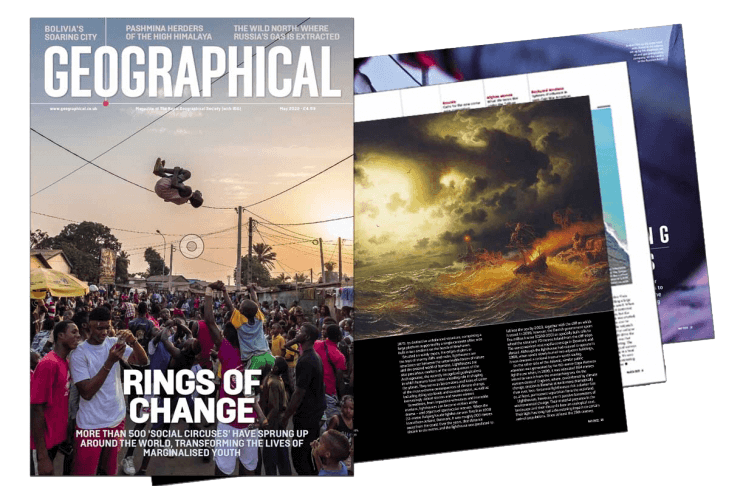
Tim Marshall examines why Australia and the US are so concerned about China’s new security deal with the Solomon Islands
Geopolitical Hotspots
The wisdom of the Solomon Islands’ prime minister, Manasseh Sogavare, is dividing opinion across the Pacific. ‘Why should anyone care about the Solomon Islands, pop. 800,000?’ you might ask. Answer: because the islands are part of what Australia and the USA regard as a defence shield stretching from Papua New Guinea through to Vanuatu and Fiji – and China is putting dents in that shield.
Prime Minister Sogavare has drafted an agreement with Beijing which opens the door for the Chinese navy to access ports in the islands and deploy ‘the forces of China’ to protect Chinese people and projects. That set alarm bells ringing in Canberra, Wellington, Washington and in the islands themselves. It could also see a change in Australia’s defence posture.
On the domestic front, Sogavare’s shift towards China risks widening the rift between the central government, on the island of Guadalcanal, and the regional government in Malaita Province – the most populous island in the archipelago. There have been years of tension between them which on several occasions has broken out into violence. The most recent unrest came last November following two years of simmering resentment at the 2019 decision to recognise China over Taiwan. This quickly descended into violence and attacks against Chinese people and the looting of shops in the Chinatown district in the capital, Honiara. Sogavare asked neighbouring governments for help and security forces from Australia, New Zealand, Papua New Guinea, and Fiji flew in to quell the violence.
The break with Taiwan followed an offer from China of US$500 million to switch sides. Beijing has spent years persuading most of the smaller Pacific countries to do the same. The Malaita Province prime minister, Daniel Suidani, opposes the move and fears China is leading the country into a debt trap.
As far as is known, the agreement does not allow for a Chinese naval base, although neighbouring powers are concerned this may happen. New Zealand’s prime minister, Jacinda Ardern, views the deal as ‘gravely concerning’. The president of the Federated States of Micronesia, David Panuelo, has ‘security concerns’ and Australia’s chief of joint operations, Lieutenant General Greg Bilton, argued that in the event of a Chinese naval base being built, it ‘would change the way we would undertake day-to-day operations, particularly in the air and in the sea’.
Mr Sogavare was having none of this. Criticism was ‘very insulting’ and islanders were being ‘branded as unfit to manage our sovereign affairs’ by other nations. By ‘other’ he means Australia which must tread a careful path so as not to be seen as the inheritor of Britain’s colonial attitude. In truth, Australia tries hard not to be that country but Sogavare knows the electoral advantages of playing the card, and of playing Beijing off against Canberra. He also knows the small Pacific island states are not significant economic partners for either country, but the region is becoming more strategically important for Australia and the USA as they try to contain China, and as China tries to break out into the world’s biggest ocean.
Most of Australia’s trade to the USA and Japan passes through the Pacific Islands. After successfully persuading most of the small states to switch support from Taiwan, China now wants more. It has seen the ‘Quad’ agreement between India, Japan, the USA, and Australia grow in importance over the last few years, followed by the AUKUS deal between Australia, the UK, and the USA. Both threaten to keep China within the First Island Chain near its coastline. Deals such as the one with the Solomon Islands are Beijing’s pushback.
Canberra’s fear is that in years to come Chinese bases, deep out in the Pacific, could cut Australia’s key trade routes and prevent it co-ordinating with allies on security issues. It is already moving to prevent this. It hopes to maintain close ties with Papua New Guinea by redeveloping a naval base on Manus Island (in northern Papua New Guinea) in a joint venture involving US navy personnel. It’s also looking to build a second port in Darwin which analysts believe could be used as an amphibious base for joint operations by the Australian military and the 2,500 US Marines based near the city.
Now, it needs to persuade the Solomon Islands to keep China at arm’s length and ensure none of the other small states fall into China’s sphere of influence. A shield is no good if it has several large holes in it.

Subscribe to our monthly print magazine!
Subscribe to Geographical today for just £38 a year. Our monthly print magazine is packed full of cutting-edge stories and stunning photography, perfect for anyone fascinated by the world, its landscapes, people and cultures. From climate change and the environment, to scientific developments and global health, we cover a huge range of topics that span the globe. Plus, every issue includes book recommendations, infographics, maps and more!




